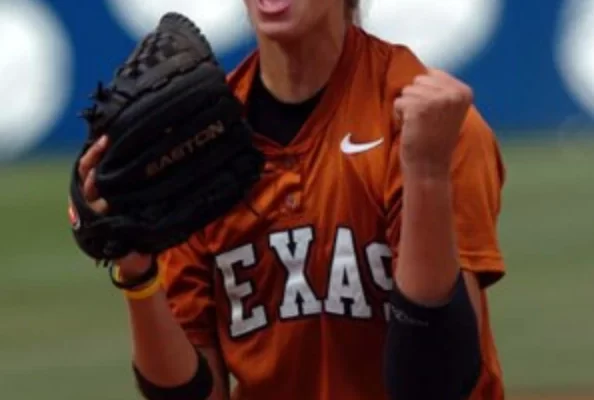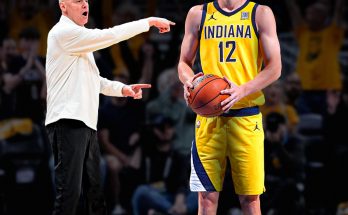ESPN Report Declares Texas Icon Cat Osterman the Greatest College Softball Pitcher of All Time, Surpassing Legends Like Monica Abbott, Jennie Finch, Lisa Fernandez, and More.
In a move that sparked both celebration and spirited debate across the softball world, ESPN has officially named Texas Longhorns legend Cat Osterman the greatest college softball pitcher of all time. The recognition places her above a pantheon of elite talents, including Monica Abbott, Jennie Finch, Lisa Fernandez, and others who have defined eras in NCAA softball. For Osterman, it’s another towering achievement in a career that was already packed with dominance, records, and accolades. But to be labeled the greatest ever? That distinction carries weight unlike any other.
Osterman’s collegiate career with the University of Texas from 2002 to 2006 was nothing short of spectacular. She posted eye-popping numbers and pitched with a style and ferocity that made even the best hitters in the game look ordinary. Over four seasons — interrupted by a year off in 2004 to participate in the Olympics — she compiled a career ERA of 0.51, a record of 136-25, and 2,265 strikeouts. She still holds the NCAA record for the highest strikeout-per-seven-innings ratio at 14.34. Osterman was a three-time National Player of the Year and a four-time All-American. Her command of the circle was almost supernatural, combining pinpoint precision with a devastating rise ball that left hitters swinging at air.
ESPN’s selection of Osterman as the all-time greatest isn’t just based on numbers, though hers are peerless. It also considers the context of her era and her influence on the sport. Osterman played during one of the most competitive periods in college softball history, regularly facing powerhouse programs like Arizona, UCLA, and Tennessee. Yet, she dominated consistently. Against ranked teams, she didn’t back down — she leveled up. Her legacy was built not just on regular-season brilliance but on postseason performances where the stakes were highest and the pressure greatest.
Perhaps what separates Osterman most from other greats is her combination of statistical dominance and sustained excellence across multiple levels. While some elite pitchers peaked in college and tapered off afterward, Osterman only seemed to evolve. Her success translated to the international stage, where she helped Team USA win a gold medal at the 2004 Athens Olympics and a silver at the 2008 Beijing Games. She even came out of retirement to compete in the Tokyo 2020 Olympics at age 38, leading Team USA to a silver medal. That kind of longevity and commitment to excellence deepened her case as the sport’s greatest pitcher — not just in college, but in history.
Still, to crown one pitcher as the best ever means comparing giants. Monica Abbott, who played for the University of Tennessee, was a strikeout machine in her own right. She holds the NCAA record for most career wins (189) and career strikeouts (2,440). Her 724 strikeouts in a single season in 2007 remain untouched. Abbott’s power, endurance, and consistency made her a force unlike any other. But while her volume numbers surpass Osterman’s, many analysts argue that Osterman’s efficiency, ERA, and overall dominance give her the edge.
Then there’s Jennie Finch, the face of the sport for many Americans in the early 2000s. At Arizona, Finch went 32-0 during her junior year and was a two-time All-American. She led the Wildcats to a national title in 2001 and, like Osterman, became a key member of Team USA. Finch’s charisma and role in popularizing the sport cannot be overstated. She transcended softball, appearing on television shows and in commercials, helping to grow the game’s popularity. But when comparing her raw collegiate numbers and pitching impact with Osterman’s, the Texas ace still holds the statistical upper hand.
Lisa Fernandez, one of the most decorated pitchers and hitters in NCAA history, adds another layer of comparison. At UCLA, Fernandez was a two-time national champion and a three-time Honda Award winner. She posted an unbelievable career ERA of 0.22 and could hit as well as she pitched, making her one of the greatest two-way players the sport has seen. In terms of pure effectiveness and impact on the field, Fernandez is perhaps the closest to challenging Osterman. But ESPN’s ranking focuses exclusively on pitching, and when isolating that component, Osterman’s strikeout rates and presence on the mound gave her a decisive advantage in their evaluation.
Danielle Lawrie, Keilani Ricketts, Rachel Garcia — all elite pitchers with dominant runs — have also built resumes worthy of Hall of Fame status. But Osterman’s longevity, combined with her statistical excellence and performance on the biggest stages, allowed her to rise above even these formidable talents. What makes her career even more extraordinary is that she achieved all of this without the benefit of playing for traditional blue bloods like UCLA or Arizona. She put Texas softball on the map, making the Longhorns a perennial national contender and giving the Big 12 a powerhouse to compete with the Pac-12 and SEC dynasties.
Beyond the numbers and accolades, Osterman’s impact is deeply cultural. She inspired a generation of young girls to pick up a softball and dream of greatness. She became a model of professionalism, grit, and competitive excellence. Watching her pitch was like watching a maestro conduct a symphony. Every pitch had a purpose. Every at-bat was a battle of wills, and more often than not, Osterman emerged victorious.
Her influence also extends into coaching and player development. Since retiring from professional play, Osterman has remained deeply involved in the sport. She has served as a college coach and is an ambassador for softball’s growth at both the grassroots and professional levels. Her insights, leadership, and continued visibility in the sport have helped elevate its profile and ensure that her legacy is not just one of past dominance but future progress.
ESPN’s choice wasn’t made lightly. Their analysts, writers, and former players considered every metric and anecdote, watched hours of film, and debated every angle. While any ranking of this nature is subjective and open to debate, the consensus among many in the softball community is that Osterman’s case is overwhelming. She didn’t just dominate; she revolutionized. She redefined what was possible from the circle and set new standards for future generations.
Of course, such declarations often stir discussion. Some fans argue for Abbott’s sheer volume, others for Finch’s charisma and national appeal, and others for Fernandez’s versatility. That’s the beauty of sports history — greatness doesn’t come in just one form. But the decision to elevate Osterman to the top of this elite list speaks volumes about what she accomplished, how she did it, and how long she did it for.
Even those she surpassed have expressed admiration. Monica Abbott has praised Osterman’s consistency and competitive fire. Finch has called her one of the smartest pitchers she’s ever seen. Lisa Fernandez, herself a fierce competitor, has acknowledged the impact Osterman had on pushing the sport forward. That kind of peer recognition is telling. When the best of the best point to someone else as the standard, it carries a significance statistics alone cannot convey.
In her post-playing career, Osterman remains a powerful voice in the sport. She is a vocal advocate for increased visibility, pay equity, and support for women’s athletics. She understands the platform she holds and uses it not for personal glory, but to build the future. In many ways, that makes her even more legendary. She’s not just the greatest college pitcher of all time; she’s one of the sport’s most enduring and progressive figures.
For Texas fans, the honor is validation of something they’ve long believed. For the broader softball world, it’s a moment to celebrate a career that was both dominant and transformative. And for young players dreaming of reaching the pinnacle of the game, it’s a reminder that greatness is earned through work, resilience, and an unrelenting desire to be the best.
As the years pass and new stars rise, Cat Osterman’s legacy will remain the gold standard. Others may break records or win titles, but few will do it with the consistency, dominance, and impact that defined her storied career. ESPN’s decision may be bold, but it’s rooted in truth: in the long and storied history of college softball, no pitcher did it better than Cat Osterman.



